- Home
- Nick Carter
Nick Carter Detective Story Collection Page 2
Nick Carter Detective Story Collection Read online
Page 2
"Well, that is then the first thing that I am going to look for."
"And the next?"
"Will depend upon my success with the first. Is that all, inspector?"
"Nearly. You will find the house exactly as I found it when I first went there to investigate; and now, goodnight, Nick," continued the inspector, rising, and taking a large envelope from his pocket.
"This," he said, "contains the entire case from first to last, and you may read it over at your own convenience. Nothing is omitted, and yet very little is said that is worth reading."
"It is that Eugenie La Verde was choked to death, and that the murderer escaped and left not the slightest clew as to his identity or his haunts."
"Exactly. And now you must find him."
"I will try."
"If anybody can succeed, you can and will."
"Thanks; I will try."
"Good-night."
"Good-night."
The door closed, and the great director of detectives was gone.
CHAPTER III.
THE FIRST CLEW.
On the following morning Nick went at once to Eugenie La Verde's house in Forty-seventh street, disguised as a plumber.
The room which she had formerly occupied was nearly in the same condition in which it had been found on the morning after the murder, and a careful search offered no immediate suggestion to the detective.
From the sleeping room, he passed to the parlor floor, where he inspected all of the window-catches and appliances, casings, and panels.
Again without result.
Presently, he approached the stairs which led from the parlor floor to that below.
The door of communication was at the foot of the stairs, and was both locked and chained on the inner, or parlorfloor side.
There was nothing faulty about either the lock, chain, or door. They were evidently perfect, and he turned his attention to the stairs.
Stair-ways are convenient arrangements through which to construct a secret passage-way, and Nick never neglected them.
Suddenly he made a discovery. The third step from the bottom was not secure in its place.
For more than two hours he continued the search, but without further result.
It was nearly dark when Nick was reminded of the fact that he was hungry, and he quietly left the house in search of a convenient restaurant.
Two blocks away he found a beer saloon, which advertised meals at all hours.
Having entered and ordered what he wanted, he was presently engaged in eating it, when two swarthy, ill-conditioned fellows entered the saloon and seated themselves at the second table from him.
The very first words uttered by the men caused him to listen attentively:
"Captain, Inspector Byrnes made a call last night."
"Where?" asked the one addressed as captain."
"Upon that devil of a detective. I don't care to mention his name here."
"Ah; the one whom Sindahr calls the little giant? Exactly.
"Well, what of it?"
"It may be that he has set him upon us."
"Bah! No. There are no reasons for that. The inspector does not even know that we exist."
"He knows most things."
"Yes, but nothing of us. Still it may be well to-did you watch for the 'the little giant.'?"
"Yes."
"Has he gone out?"
"One never can tell, but I think not. I left there an hour ago, and Tony has taken my place. I could swear that he had not left the house when I came away."
Nick smiled.
"Come, John," said the captain. "We have been here long enough and we have other work to do. It is dark now. Come."
They rose quickly and left the place, and upon the instant Nick decided to shadow them.
CHAPTER IV.
SHADOWING.
Nick did not rush from the saloon as soon as the two men left, but sauntered carelessly to the bar, paid for what he had eaten and drank, and then went slowly out.
As he had suspected, they were not far away. They were standing upon the curbstone apparently engaged in earnest conversation, but in reality waiting to see if they would be followed.
The fact that they were so cautious, gave added zest to the chase.
Nick sauntered carelessly past them, to the avenue which was only about two hundred feet farther on.
A hall-way door between two stores stood conveniently ajar on the opposite side, and he entered it with the air of one who lived there.
Pausing in the dark hall-way, he began a rapid change in his disguise, and presently he looked like an old man in poor circumstances who worked hard all day, and took an airing and a glass or two of toddy in the evening.
Five or ten minutes passed, and then the two men suddenly separated, the one called John going away rapidly in the opposite direction, and the captain jumped upon a car that was passing at that moment.
He took his stand upon the rear platform with his back toward the car, as though he thought that he might be followed.
A car was coming up the avenue. It had to pass between Nick and the car that the captain had boarded.
For a moment, Nick would be screened from view from the platform of the down-town car.
He utilized that moment to the best advantage.
He leaped nimbly into the street and succeeded in getting two doors away before the cars had passed each other.
When they had passed, he was standing idly before the door of a "gin-mill" leisurely picking his teeth, as though he had just come out.
Presently he walked down the street, rather rapidly, to be sure, but not fast enough to excite the suspicion that he was following anybody.
Soon a second car overtook him, and he got upon the front platform.
The two cars were less than a block apart, and the detective could see his man easily.
At Fourteenth street the captain turned and abruptly entered the car on which he was riding and passed out upon the front platform.
Here the spasmodic flashing of a match presently denoted that he was lighting a cigar.
Then, with a quick run, Nick left his car and overtook the one in which the captain was a passenger, and going inside, seated himself at the forward end.
"This is more comfortable," he thought. "It is much less work to watch him from here."
Block after block was passed, but the captain showed no sign of leaving the car, nor did he, until it reached the end of the route at the Astor House.
Then he stepped off and boarded a south-bound Broadway car, upon which he remained until it reached South Ferry.
There the captain took the Hamilton Ferry boat, landed in Brooklyn, and started away down the street along the water-front.
Nick followed for a mile or more, when suddenly the captain turned and went out upon a pier.
"He will stop and look around when he gets out there," thought Nick, "so I will wait here."
He dodged into a deep shadow close to the water's edge, just where a boat was tied by a rope to a cleat upon the dock.
"The very thing!" thought Nick.
In an instant he had untied the rope and seized one of the oars; the next, he was sculling the little craft rapidly and silently along in the shadow of the pier.
Suddenly the man whom he was following, paused. Then turning, he came to the edge of the pier and looked over, full at Nick.
CHAPTER V.
TRAPPED.
"Hey, there!" said the captain, in a voice loud enough for Nick to hear, and yet with considerable caution.
Nick ceased sculling, but did not reply.
"Do you want to earn a dollar or two?" was the first question.
"Sure!" was Nick's laconic reply.
"Take me aboard, then."
"What fur?"
"I want to go down the bay a little way."
"Ye've struck the wrong party, boss. I ain't on that kind of a lay."
"I'll make it five."
"Haw fur d'ye wanter go
?"
"About half a mile."
"What fur?"
"That's my business. Come, will you take me or won't you? I can't stand here arguing all night."
"Cops after you, boss?"
The man shrugged his shoulders and turned away.
"I'll take ye ef it ain't too fur," called Nick. "Climb in."
The captain returned. The boat was drawn up close to the dock, and with a quick spring the stranger alighted upon one of the midship seats.
"Now make haste," he ordered.
"Which way, boss?"
"Down."
"How fur?"
"Go until I tell you to stop."
Nick obeyed.
The tide was with them and was running like a millrace, so that they made quick time, and a mile was passed over in silence.
Then Nick stopped rowing.
"Say, boss," he remarked, "you said half a mile, an' we've already came over a mile. - Is the place much furder?"
"Only a little way. Row on."
"Well, I want my five dollars afore I go any furder.
"You do, eh? Well, look at this."
He was pointing a six-shooter directly at Nick's heart.
"I'm a-lookin'," said Nick, coolly, "but that ain't no five dollars."
"Will you row on?"
"No, not till I gits me pay."
"Curse you, do as I tell you or I'll put a hole in you big enough to see through."
Nick calmly drew the oars into the boat.
"Look ahere," he said, "wot d'ye take me fur, anyhow, boss? D'ye think that I'm a rabbit that I'm afraid o' that pop-gun o' yourn? Not much! Don't ye s'pose I know ye dassent use it out here at this time o' night?
"It's too early for killin', boss. I've done a job 'r two of that kind myself, an' I'm posted. Fork over, an' I'll row ye where ye wanter go, but I'm blowed ef I will ef ye don't, see?"
The passenger growled out something which sounded very much like a curse, but he drew a gold piece from his pocket and flung it to Nick.
"Now go ahead," he muttered, "for I'm losing time."
"Nobody's fault but yer own," was Nick's reply, and then he seized the oars and the boat shot ahead again.
"Easy, there, easy," said the passenger, suddenly. "Do you see that sloop yonder?"
"I do."
"Put me aboard of her."
"Keyreckt, boss. I've had my eye on her before."
"You have, eh? Why?"
"That's my bizness, see? To have my eye on such things."
"Ah! a river pirate, eh?"
"Me? Oh, no! I'm a harbor-broker. Here you are. Ketch hold of the rail. So."
The passenger climbed aboard of the sloop, while Nick allowed his boat to remain just where it was.
"Well, what are you waiting for?" asked the captain.
"Fur you. Don't ye want me to take ye back?"
"No. I do not."
"Nor come after ye?"
"No."
"What are ye goin' ter do? Swim ashore?"
"Perhaps."
"Well, good-night, boss. Be keerful of the pop-gun; it may go off sometime."
"It will be very apt to if you don't become scarce around here pretty soon."
Nick laughed lightly and pushed his boat away from the sloop. Then he picked up his oars and rowed away in the darkness.
"I wonder what he would say if he knew that it was Nick Carter who rowed him down the river to-night?" thought the young detective.
Not very far away from where the sloop was anchored was another craft of less pretentious build, although considerably larger.
It was a schooner, and Nick pointed his boat's prow directly at it.
The outlines were just visible, for the night was growing steadily darker.
Huge clouds were rolling up from the eastward, and the detective noticed with satisfaction that ere another half-hour the night would be literally black.
He reached the schooner, passed it, and then ceased rowing, allowing his boat to drift slowly back until he was thoroughly concealed behind the black hull.
Then an entire half hour he sat there and waited.
Darker and darker grew the night.
The darkness became so intense that he could not see his hand before his eyes, and great drops of rain began to spatter upon him.
"A perfect night for this sort of work," he mused, as he pushed his boat free from thes schooner's side, "and unless I am greatly mistaken, I can make fast to that sloop without being seen or heard. I'm going to try, anyhow."
The tide was still running very strong, and it was hardly necessary for him to do more than steer in order to reach the desired spot.
Not a thing could be seen. It seemed as though the whole world had suddenly gone out of existence, having naught but blackness behind.
Presently he drew in his oar and went to the bow.
He was not a moment too soon.
Knowing instinctively, rather than seeing, that he was about to collide with the hull of the sloop, he put out his right hand, and was thus enabled to prevent the shock and noise of a collision. Certain discovery would have followed, and his plans would have failed.
Thus far he had made not a sound.
Nick climbed aboard, and crept softly toward the companion-way, pausing every second step to listen, but hearing nothing.
He went over the entire deck, and finally descended to the cabin, - moving with the same stealthy caution.
Nick had almost decided that he had been outwitted, and that the sloop was deserted, when suddenly, without any warning whatever, he received a violent blow on the head and sank senseless to the deck.
"Did you lay him out, John?" asked the cool tone of the man whom we know as captain.
"As stiff as a door, cap."
"Good. Close the hatch so that no light can get out, and we'll have a look at him."
"Better chuck him into the river now," said John, gruffly. "I hit him hard enough to break a dozen heads."
"No. Do as I say. Time enough to throw him overboard when we know he's dead."
The hatch-way was closed and a light procured.
The captain bent over the senseless form of Nick Carter and closely examined his face.
"Boys," he said, presently, "this fellow is made up. He is a fly cop, as I more than half suspected, and he must die."
CHAPTER VI.
TONY, THE STRANGLER.
An ominous silence followed the captain's discovery, which was presently broken by the voice of John, who growled:
"Shall I stick him now?"
"No-no; wait. Haste never does any good. Besides, I want to question him before he takes his bath."
Some brandy was poured into Nick's mouth, and he presently opened his eyes, and looked around him.
He saw that five men were in the cabin with him, and realized instantly that he was in the hands of a gang who would not hesitate at murder, and by the expression of their faces he judged that they meant to mete out small mercy for him.
That he was right, the sequel proved.
The captain stood nearest him, and Nick noticed that his face was hard and cruel.
He also noticed another thing with a great amount of satisfaction.
The men were so confident of the strength of superior numbers, and the meekness consequent upon the force of the blow that their victim had received, that they had not thought it worth their while to bind him.
It did not occur to them that one man could get away from five, particularly when they surrounded him in a little cabin like that of the sloop.
"Who are you?" asked the captain, coldly.
"Jest what I was wonderin'," replied Nick. "I feel sorter dazed with the hit on my head."
"Answer me!"
The voice was cold and stern, and the demand was emphasized by the exhibition of a glittering knife held menacingly before the detective's eyes.

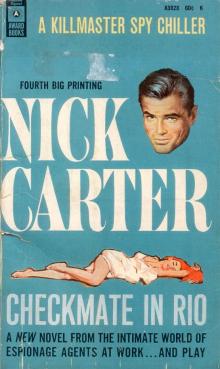 Checkmate in Rio
Checkmate in Rio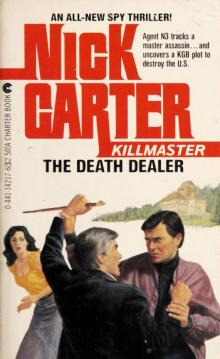 The Death Dealer
The Death Dealer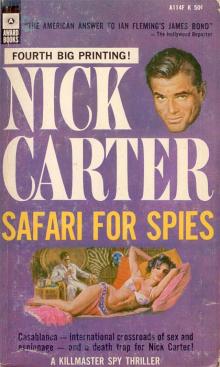 Safari for Spies
Safari for Spies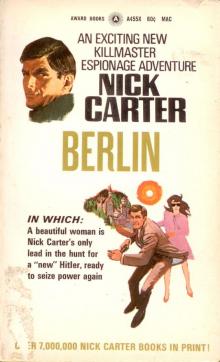 Berlin
Berlin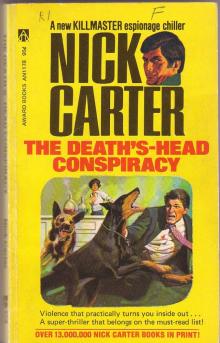 The Death’s Head Conspiracy
The Death’s Head Conspiracy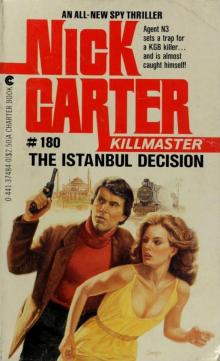 The Istanbul Decision
The Istanbul Decision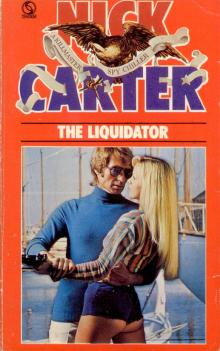 The Liquidator
The Liquidator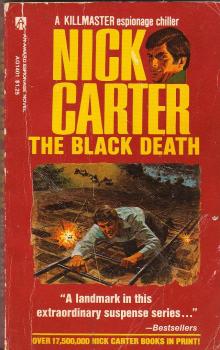 The Black Death
The Black Death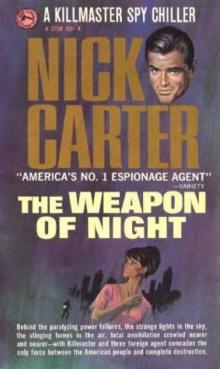 The Weapon of Night
The Weapon of Night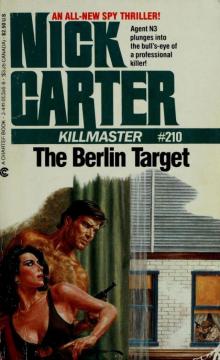 The Berlin Target
The Berlin Target Temple of Fear
Temple of Fear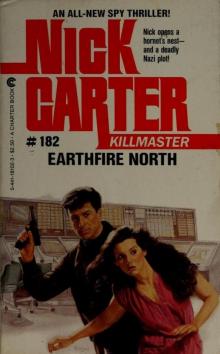 Earthfire North
Earthfire North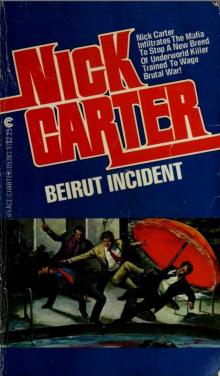 Beirut Incident
Beirut Incident White Death
White Death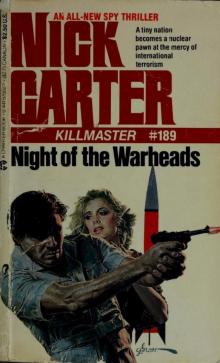 Night of the Warheads
Night of the Warheads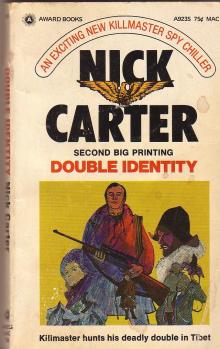 Double Identity
Double Identity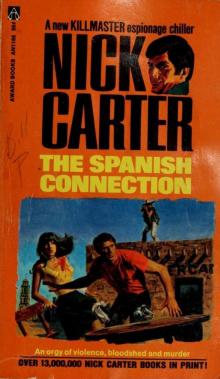 The Spanish Connection
The Spanish Connection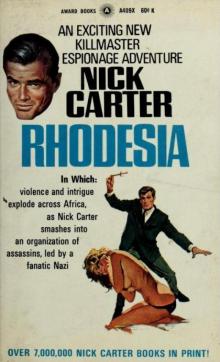 Rhodesia
Rhodesia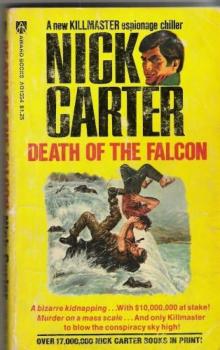 Death of the Falcon
Death of the Falcon The Executioners
The Executioners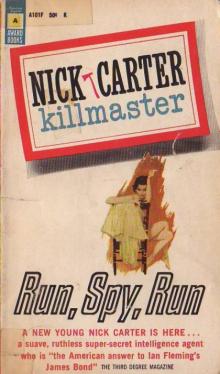 Run, Spy, Run
Run, Spy, Run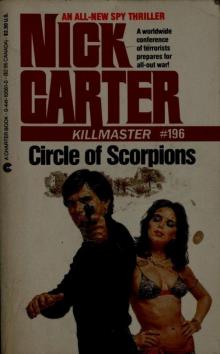 Circle of Scorpions
Circle of Scorpions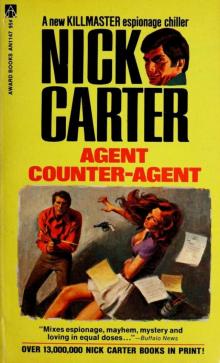 Agent Counter-Agent
Agent Counter-Agent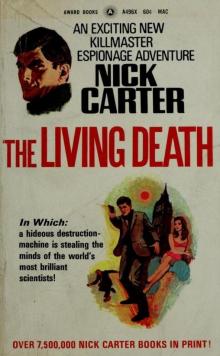 The Living Death
The Living Death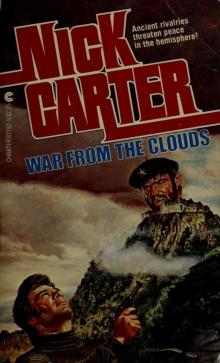 War From The Clouds
War From The Clouds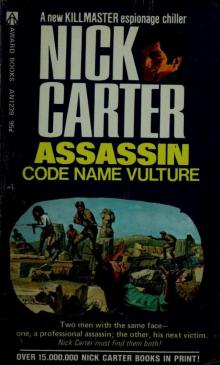 Assassin: Code Name Vulture
Assassin: Code Name Vulture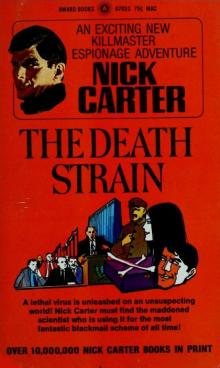 The Death Strain
The Death Strain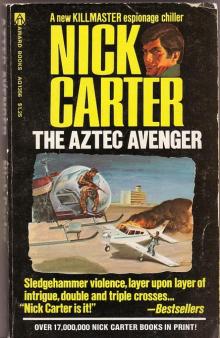 The Aztec Avenger
The Aztec Avenger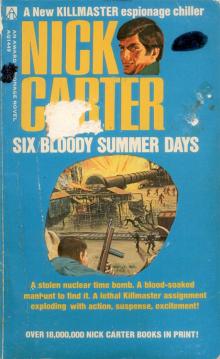 Six Bloody Summer Days
Six Bloody Summer Days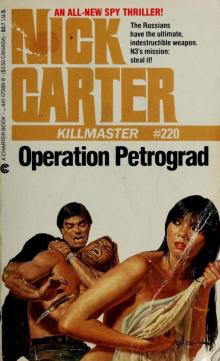 Operation Petrograd
Operation Petrograd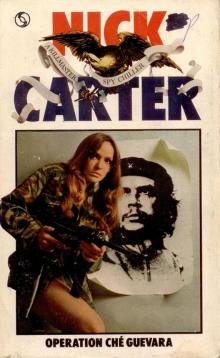 Operation Che Guevara
Operation Che Guevara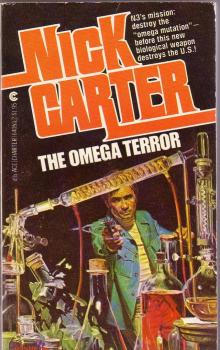 The Omega Terror
The Omega Terror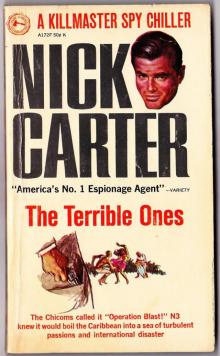 The Terrible Ones
The Terrible Ones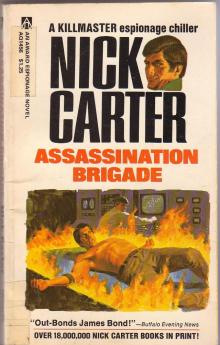 Assassination Brigade
Assassination Brigade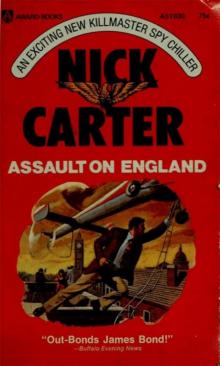 Assault on England
Assault on England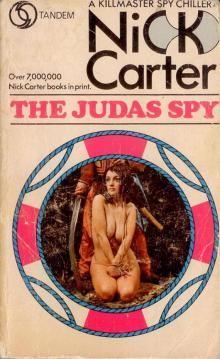 The Judas Spy
The Judas Spy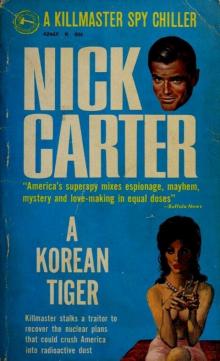 A Korean Tiger
A Korean Tiger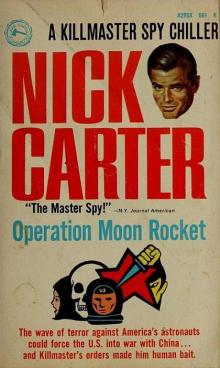 Operation Moon Rocket
Operation Moon Rocket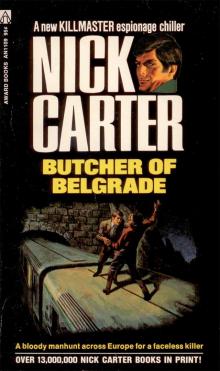 Butcher of Belgrade
Butcher of Belgrade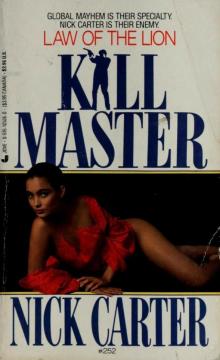 Law of the Lion
Law of the Lion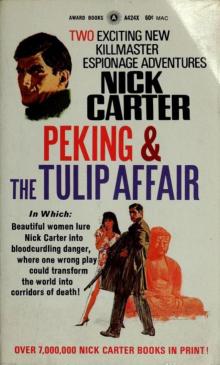 Peking & The Tulip Affair
Peking & The Tulip Affair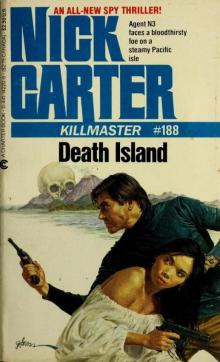 Death Island
Death Island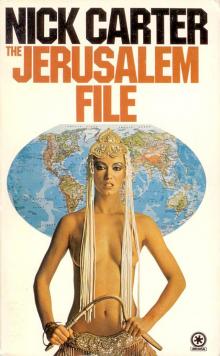 The Jerusalem File
The Jerusalem File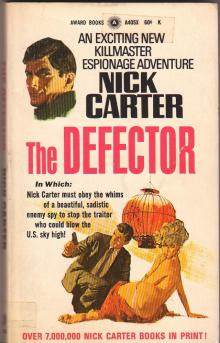 The Defector
The Defector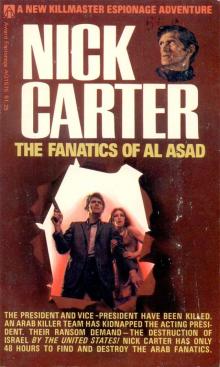 The Fanatics of Al Asad
The Fanatics of Al Asad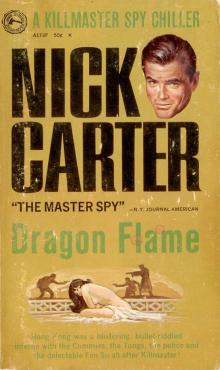 Dragon Flame
Dragon Flame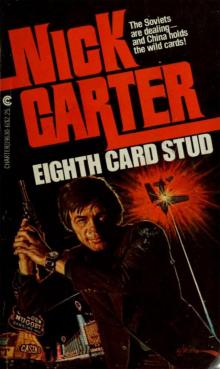 Eighth Card Stud
Eighth Card Stud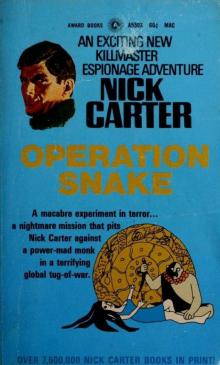 Operation Snake
Operation Snake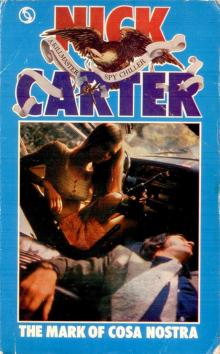 The Mark of Cosa Nostra
The Mark of Cosa Nostra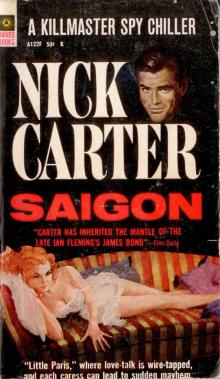 Saigon
Saigon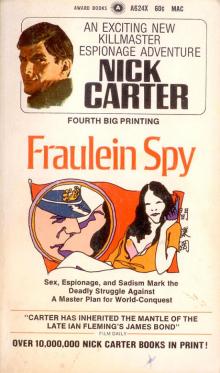 Fraulein Spy
Fraulein Spy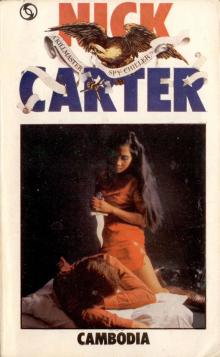 Cambodia
Cambodia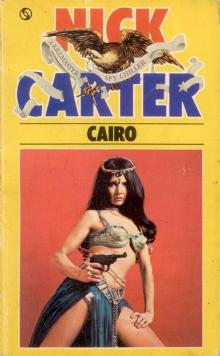 Cairo
Cairo